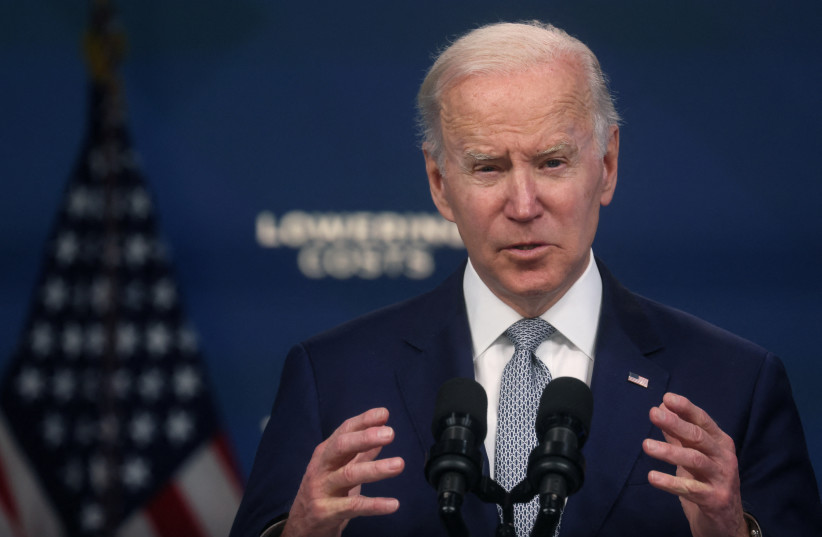The Biden administration is working on an arms deal to strengthen Turkey’s air force which would deter a conflict with Russia, analysts tell The Media Line.
For more stories from The Media Line go to themedialine.org
Özgür Ünlühisarcıkli, the director for the German Marshall Fund’s office in Ankara, told The Media Line that the war in Ukraine has contributed to a new dynamic for Turkey with the United States, where the US and Turkey are relying on each other to deal with Russia.
“Turkey having a strong air force is important from the perspective of deterrence. But, if there is a war, then of course Turkey having a strong air force would be very important for the war effort,” Ünlühisarcıkli said, adding that a direct conflict with Moscow appears unlikely.

US President Joe Biden sought approval from congressional leaders to sell missiles, radars and electronics to Turkey for its F-16 fighter jets, the Wall Street Journal reported on Wednesday.
Turkey will spend more than $500 million on the arms deal if it goes through, Bloomberg
reported.
Ünlühisarcıkli said the fighter jets are central to defending Turkey’s territory since a
missile defense system would be very expensive.
There were fears of an escalation in 2015 when a Turkish F-16 jet shot down a Russian fighter jet that Ankara accused of entering its airspace.
Ünlühisarcıkli said relations improved between the two NATO allies after Ankara offered to provide security at the Kabul airport in Afghanistan. “Before that, Turkey was characterized as ‘our so-called ally’ by the US State Department, but after that, the terminology changed to ‘our valuable ally.’”
Ties with the US have been strained for years. In 2018, Washington placed limited sanctions on Turkey over its detention of an American pastor, leading to an exchange rate crisis for the lira.
The most contentious current issue between the countries is Ankara’s purchase of the Russian S-400 anti-ballistic missile defense system. Ankara has been adamant that it will not return the Russian weapons and, in response,
Washington kicked Turkey out of the F-35 stealth fighter program. Last year, President Recep Tayyip Erdogan said the US suggested selling Turkey F-16 fighter jets in lieu of the F-35s it would not be getting. With Turkey in economic crisis and slipping poll numbers for the ruling party, Erdogan has sought to warm ties with wealthier countries in the hopes of bringing in more investment ahead of national elections scheduled for June 2023. Biden’s response has been lukewarm.
It took the US president more than three months after entering office last year to hold his first phone conversation with Erdogan. But the war in Ukraine highlighted Ankara’s value to NATO, with Turkey hosting talks
with top officials from Ukraine and Russia. After Russia’s invasion of Ukraine, Biden told Erdogan in a phone call that he appreciated Turkey’s efforts to seek a diplomatic solution, according to the White House.
Ankara also has contributed to NATO interests, including by selling drones to Ukraine that have played an important role in fending off Russian attacks and using its authority under the 1936 Montreux Convention to limit Russia’s access to the Black Sea. At the same time, Russia’s invasion made clear the security risks the country poses to its neighbors.
Aaron Stein, director of research at the Philadelphia-based Foreign Policy Research Institute (FPRI), told The Media Line the prospective arms deal would help maintain Turkey’s aging air force, which would advance NATO interests in the event of a war with Russia.
He said the F-16 program has been central to Turkey-US relations for decades, and that Ankara would have few options if it decided to approach other countries in hopes of securing a comparable fighter jet. “If it doesn’t go through, you’re severing basically the backbone of the modern US- Turkish relationship,” Stein said.
However, he warned that the deal faced major hurdles because there are some in Washington who are against it.
US Senator Robert Menendez, chairman of the Senate Foreign Affairs Committee, has been vocal in his criticism of Turkey in the past, saying last year that the Anatolian nation has not been committed to the principles of democracy under Erdogan. “It all comes down to whether or not the Senate Foreign Relations Committee is going to sign off” on the arms sale, Stein said.
